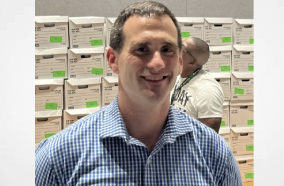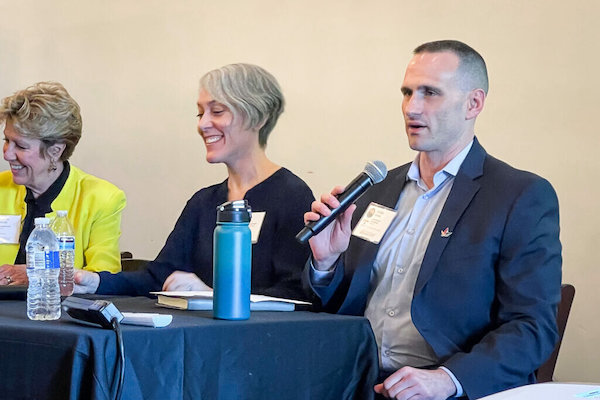Here we go again…
This time Missouri
The Missouri Independent
John Payne, managing partner at Amendment 2 Consultants, discusses legislation at an industry summit in downtown St. Louis on March 28 with Amy Moore (middle), director of the Division of Cannabis Regulation, and Mitch Meyers, partner at BeLeaf Medical (Rebecca Rivas/Missouri Independent).When John Payne was leading the campaign to legalize recreational cannabis in 2022, he faced a major hurdle.
Black business owners were largely excluded from the medical marijuana program when licenses to grow and sell cannabis were doled out by the state in 2019, and many feared history was about to repeat itself.
So to soothe the concerns and win over skeptics, Payne partnered with Black community leaders to come up with what they hoped was a solution — a social equity program, known as “microbusiness licenses,” that would diversify the industry and ensure communities most impacted by the War on Drugs were not once again left out of the burgeoning industry.
“We do know from data that the people who have been harmed by marijuana prohibition directly, Black Americans are overrepresented,” Payne, who is white, told The Independent last year.
Because marijuana prohibition did the most harm on the Black community — Black Missourians are 2.6 times more likely to be arrested for marijuana possession than white Missourians — “that should carry over into a disproportionate good impact of the microbusiness licenses,” Payne said.
But documents uncovered by The Independent show that in some cases, Payne and his business partners were the ones aiming to benefit most from the social-equity program.
Payne’s name is connected to more than 300 social-equity applications submitted earlier this year for the second round of microbusiness licenses, winning six of the 24 dispensary licenses selected through a lottery in June and officially issued on Wednesday.
For some of the applications, Payne recruited eligible Missourians and had them sign a 47-page contract that would ultimately give him and his partners 90.1% of profits and majority control of the business.
Despite only owning a fraction of the business, under state law the applicants would bear the lion’s share of the regulatory scrutiny. If they ever want to walk away from the deal, they would be required to pay a nearly $1 million fee.
Missouri revokes nine social-equity cannabis business licenses for out-of-state companies
In an interview with The Independent, Payne defended the contract, saying the arrangement was designed for people who wanted to get into the industry but didn’t want to put in their own money.
Read more



















